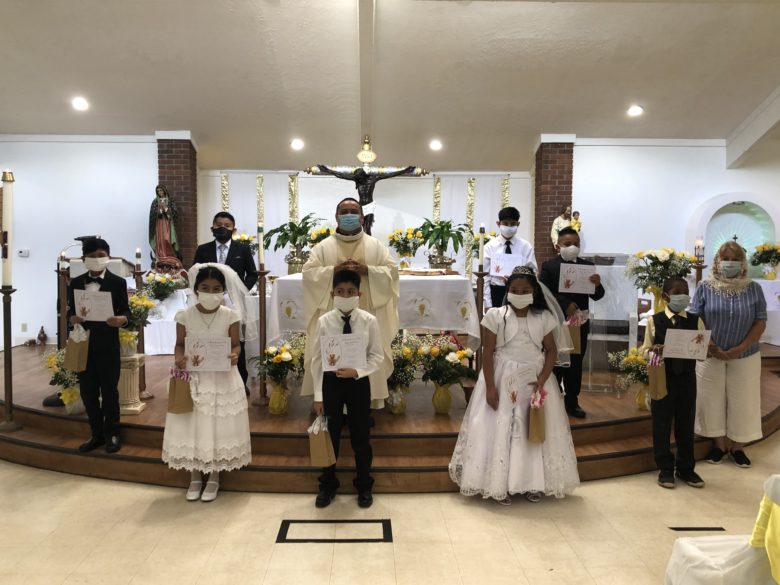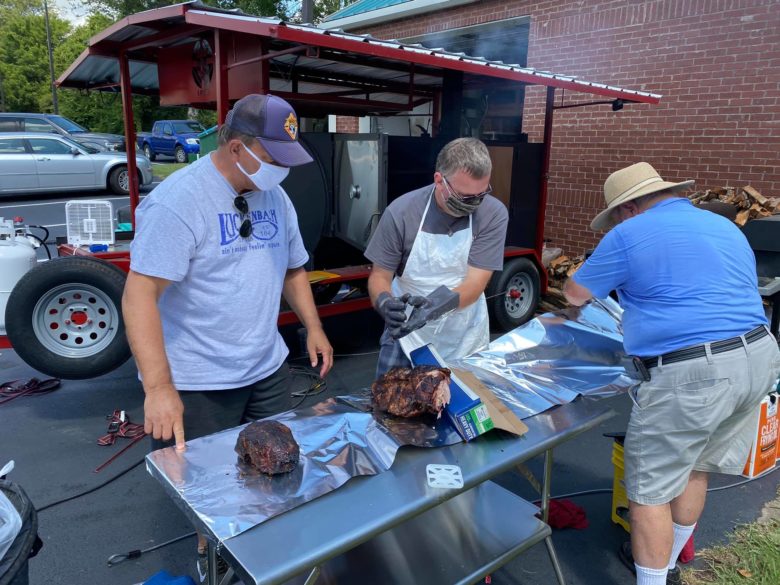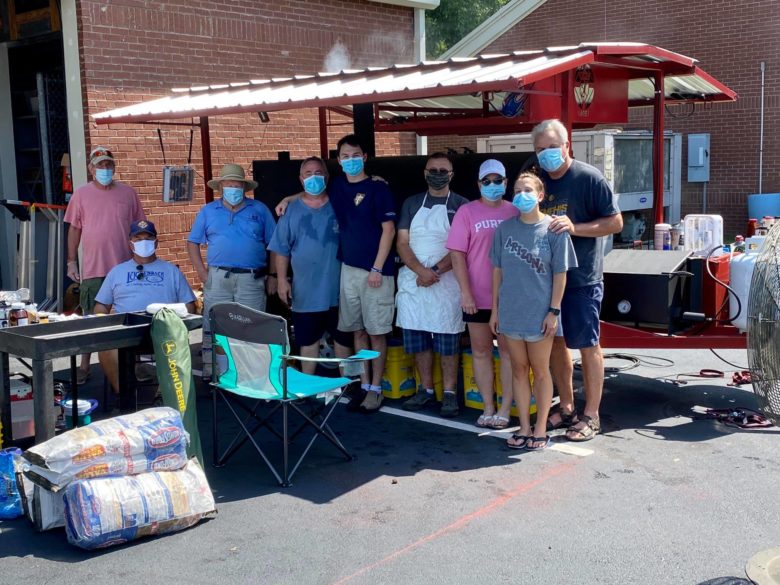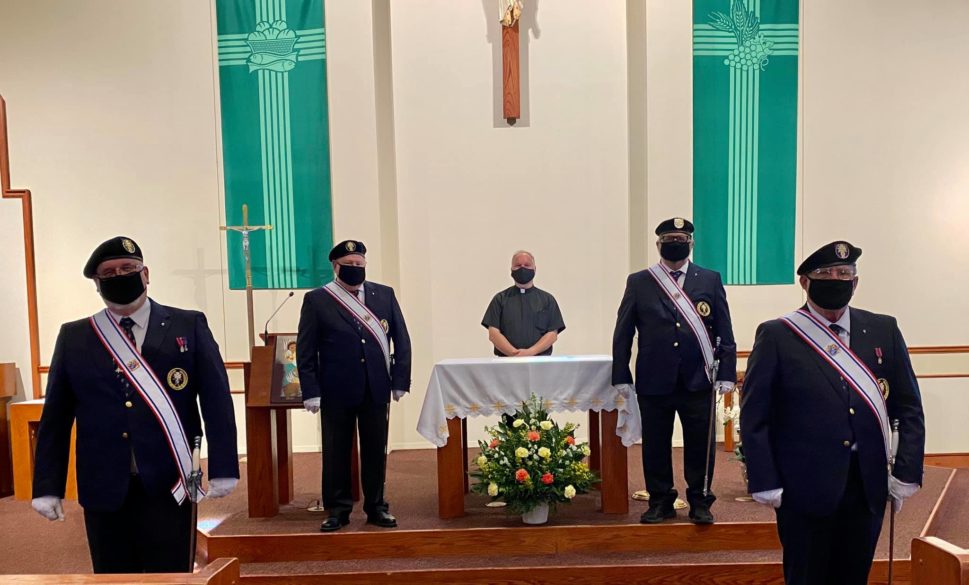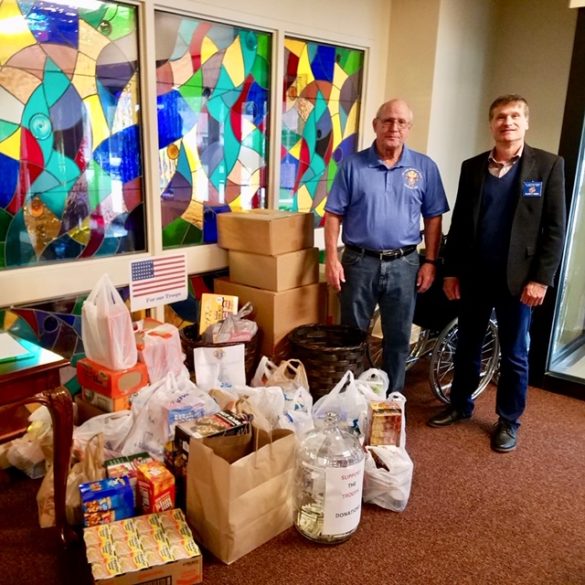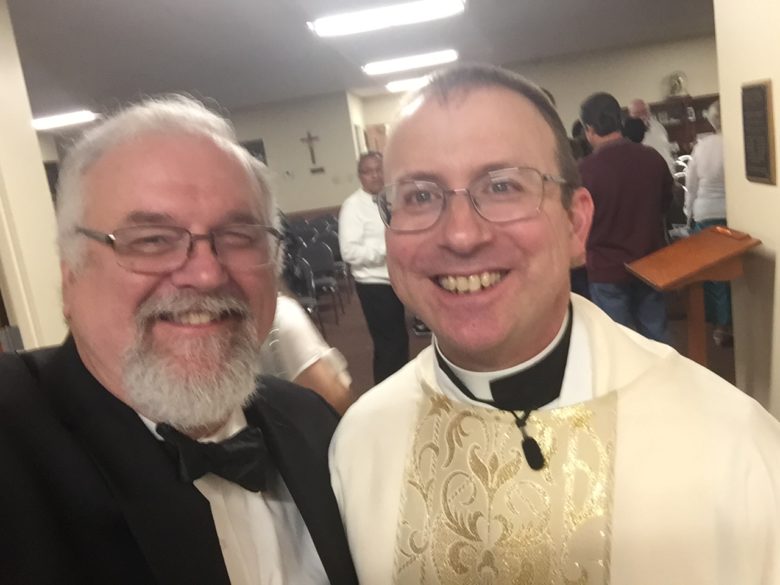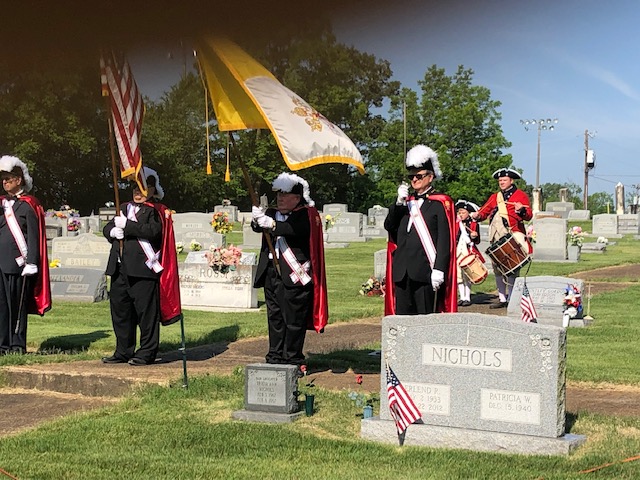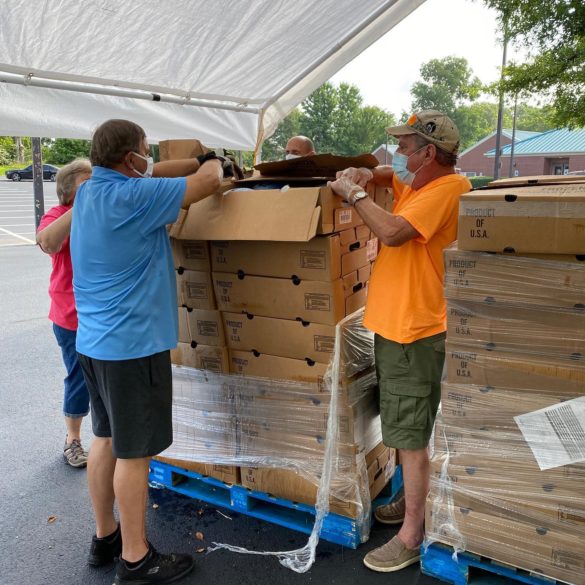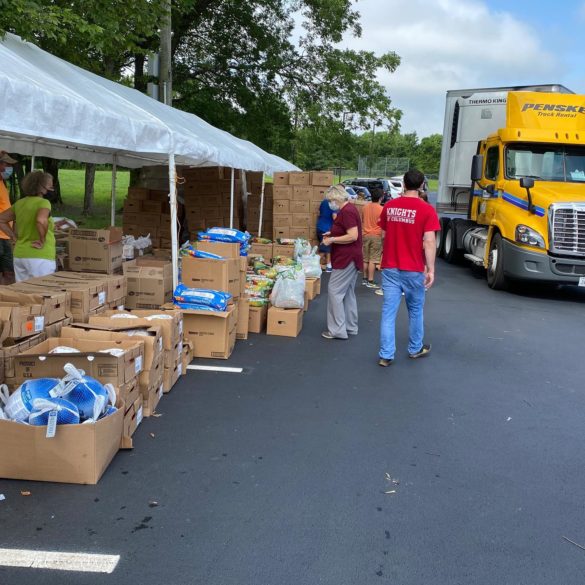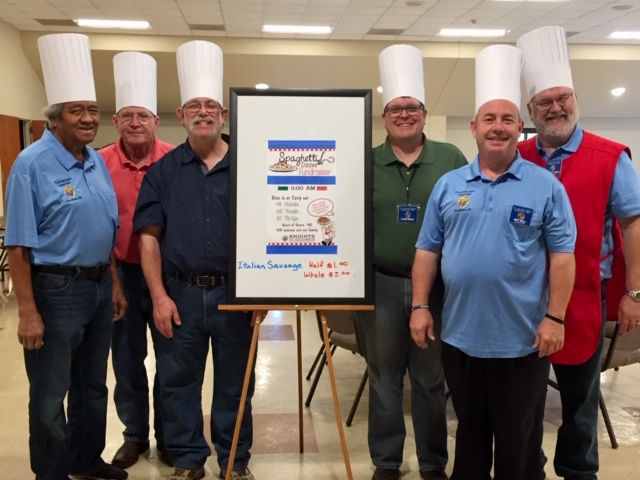By Cindy Wooden
VATICAN CITY (CNS) – If people took seriously the Gospel call to forgive one another, the world would be a much better place, Pope Francis said.
“How much suffering, how many wounds, how many wars could be avoided if forgiveness and mercy were the style of our life,” he said Sept. 13 before reciting the Angelus prayer with visitors in St. Peter’s Square.
The pope was commenting on the day’s Gospel reading, Matthew 18:21-35, in which Jesus tells his disciples to forgive “not seven times but 77 times.”
“In the symbolic language of the Bible,” the pope explained, “this means that we are called to forgive always.”
Jesus’ admonition is especially important for family life, he said. “How many families are disunited, do not know how to forgive each other? How many brothers and sisters bear resentment within? It is necessary to apply merciful love to all human relationships: between spouses, between parents and children, within our communities, in the church and in society and politics as well.”
In the day’s Gospel passage, Jesus emphasizes his point with the parable of the merciful king who forgives the enormous debt of his servant and yet that servant refuses to forgive the small debt of another servant. When the king hears about it, he hands the man over “to the torturers until he should pay back the whole debt.”
“In the parable we find two different attitudes: God’s – represented by the king who forgives a lot, because God always forgives – and the human person’s,” the pope said. “The divine attitude is justice pervaded with mercy, whereas the human attitude is limited to justice.”
Pope Francis told the people in the square that while he was celebrating Mass that morning, “I paused, touched by a phrase in the first reading from the book of Sirach. The phrase (in the Italian Lectionary) says, ‘Remember your end and stop hating.’ A beautiful phrase.”
“Just think,” the pope said, “you will be in a coffin and will you take your hatred there with you? Think of your end and stop hating, stop resenting.”
Pope Francis said that he knows it is not an easy command to follow because, even when a person thinks he or she has forgiven another, “resentment returns like a bothersome fly in the summer that keeps coming back.”
True forgiveness, he said, “is not something we do in a moment; it is something continuous against that resentment, that hatred that keeps coming back.”
When Christians pray the Lord’s Prayer, they say, “Forgive us our trespasses, as we forgive those who trespass against us.”
“These words contain a decisive truth,” the pope said. “We cannot claim God’s forgiveness for ourselves if we in turn do not grant forgiveness to our neighbor. It is a condition.”
Pope Francis summarized his talk: “Think of your end, of God’s forgiveness and stop hating. Reject resentment, that bothersome fly that keeps coming back. If we do not strive to forgive and to love, we will not be forgiven and loved either.”
Updates
Called by Name
Seminary is a challenging time on many levels. The seminarian is tasked with growing in his relationship with the Lord and listening to His voice. He is challenged in the classroom, and in the pastoral application of what he has learned. He is challenged when he was to figure out how to effectively preach and teach the faith. One of the biggest adjustments for a seminarian, however, might be becoming a “public person.”
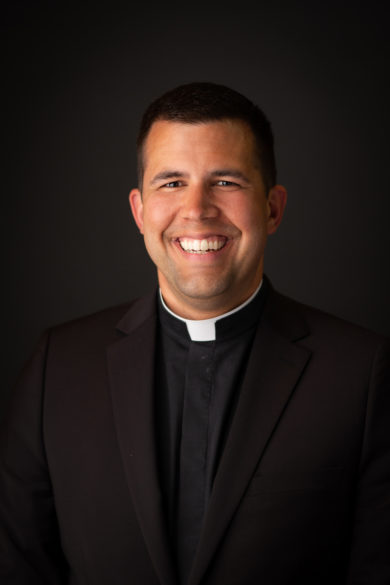
When I started working at WTOK-TV in Meridian and anchoring the sportscast each night, I couldn’t help but notice when people would stare at me. I would go to Wal-Mart and someone would glance over to me and it was for just a split second longer than a normal glance. After a while I realized that people were trying to figure out where they knew me from! Some people would recognize me and come over and speak with me like we were old friends, after all, they saw me everyday. It took time for me to get comfortable with that reality, and so it was funny to me when I left television, went to seminary, and then started wearing a roman collar and noticing a similar phenomenon. When you wear clerics, you make a statement about who you are and what you are about, and people react. Many react with curiosity, others with joy (mostly Catholics ha!), and some (very few in my experience) with suspicion or even anger or hatred.
We give seminarians a chance to get used to this experience before they reach ordination. At about the halfway point of their formation, a seminarian typically receives “candidacy.” They make a public declaration that in good conscience they believe they are being called to the priesthood, and they start to wear a roman collar in public and become a public representative of the church. The seminarian begins to see the effect that the identity that they will take on with ordination will have on their life. When someone sees a roman collar, they should expect to be cared about, listened to and respected. In some ways priests need to be “all things to all people,” especially when someone is in need. This is why the men get the chance, when they are ready, to experience this before ordination. Grace builds on nature, and so if our men do not get in the habit of being there for people in a real way before ordination, they will not magically start being there for parishioners once they get ordained. Wearing clerics before ordination can give them valuable insight into the responsibility they are taking on to care for the People of God.
I wanted to explain this process because I often get that question, and our seminarians who have received candidacy do as well: why do some guys who are not yet priests wear the collar? The roman collar does not equal priesthood, but it should make someone confident that the person wearing one knows the Lord and wants to bring them into deeper relationship with Him.
Vocations Events
Friday, October 9, 2020 – First annual Homegrown Harvest Gala and Fundraiser (virtual)
For more information and sponsorship opportunities visit: https://one.bidpal.net/homegrownharvest2020/welcome
Mystical experience and everyday people
IN EXILE
By Father Ron Rolheiser, OMI
What kinds of things help induce mysticism in our lives? I was asked that question recently and this was my immediate, non-reflected, answer: whatever brings tears to your eyes in either genuine sorrow or genuine joy; but that response was predicated on a lot of things.
What is mysticism? What makes for mystical experience?
In the popular mind mysticism is misunderstood badly. We tend to identify mysticism with what’s extraordinary and paranormal, and see it as something for the spiritual elite. For most people, mysticism means spiritual visions and ecstatic experiences which take you outside of normal consciousness.

Mysticism can be that sometimes, though normally it has nothing to do with visions, altered states of consciousness, or states of ecstasy. Rather it has to do with a searing clarity of mind and heart. Mystical experiences are experiences that cut through all the things that normally block us from touching our deepest selves, and they are rare because normally our consciousness is cut off from our deep, true, virginal self by the influence of ego, wound, history, social pressure, ideology, false fear and all the various affectations we don and shed like clothing. Rarely are we ever in touch with our deepest center, without filters, purely; but when we are, that’s what makes for a mystical experience.
Mysticism, as Ruth Burrows defines it, is being touched by God in a way that’s beyond words, imagination and feeling. God, as we know, is Oneness, Truth, Goodness and Beauty. So any time we are genuinely touched by oneness, truth, goodness or beauty, without anything distorting that, we’re having a mystical experience. What might that look like?
Ruth Burrows describes a mystical experience which radically changed her life when she was eighteen years old, a senior at a private high school for young women operated by an order of nuns, on a retreat preparing for graduation, and not very mature. She and one of her friends were not taking this retreat very seriously, passing notes to each other and pulling pranks during the conferences. At a point, their antics were disturbing enough that the nuns pulled them out of the group and had them sit in silence in a chapel, chaperoned by a teacher, whenever the rest of the class was at a conference. At first, Burrows confesses, they continued their joking around, but the hours were long and the silence eventually wore her down. Sitting alone, bored and irritated, a mystical experience graced her, uninvited and unexpected. And it came upon her not as a vision or an ecstasy, but as a moment of searing clarity. At a certain moment, sitting alone, she saw herself with absolute clarity for who she really was, in all her immaturity and in all her goodness. It changed her life. From then on she knew who she was – beyond ego, wound, immaturity, peer pressure, ideology and all affectation. In that moment she knew her deepest self purely (and the only thing that was extraordinary was its extraordinary clarity).
So, what kinds of things might induce mystical experiences in our lives? The short answer: anything that takes you beyond your ego, your wounds, your affectations, and the powerful social pressures within which you breathe, that is, anything that helps put you in touch with who you really are and makes you want to be a better person. And this can be many things. It might be a book you read; it might be the beauty of nature; it might be the sight of a newborn baby, a crying child, a wounded animal, or the face of someone suffering; or it might be what you feel deep down when you receive an expression of love, bless someone, express genuine contrition, or share helplessness. It can be many things.
Several years ago while teaching a course, I assigned the students a number of books to read, among them Christopher de Vinck’s, Only the Heart Knows How to Find Them – Precious Memories for Faithless Time. This is a series of autobiographical essays within which de Vinck simply shares very warmly about his marriage, his children, and his home life. At the end of the semester a young woman, with de Vinck’s book in her hand, said to me: “Father, this is the best book I’ve ever read. I’ve always fancied myself a very free, liberated person and I’ve slept my way through several cities, but now I realize that what I want is what this man has. I want sex to take me home. I want a home. I want the marriage bed. I know now what I need!”
Reading Christopher de Vinck’s book had triggered a mystical experience inside her, not unlike the one described by Ruth Burrows. Reading the Story of a Soul by Therese of Lisieux generally does that for me.
So, here’s my counsel: seek out what does that for you. It doesn’t have to bring tears to your eyes, it just has to point you with searing clarity towards home!
(Oblate Father Ron Rolheiser, theologian, teacher and award-winning author, is President of the Oblate School of Theology in San Antonio, Texas. He can be contacted through his website www.ronrolheiser.com.)
Persistent begger
From the hermitage
By sister alies therese
Perhaps you’ve read a couple of the wonderful books by L. Van derPost of South Africa? Besides drawing you into a tender story and then challenging you with a hard truth, he writes and shares with us an exploration of his life. Often writers (both fiction and non-fiction) take us on a trip of some sort that either ‘tells the truth’ or ‘implies a truth within a fictionalized setting.’ In either case one might discover much of the richness of the writer’s testing of his/her own life as well as the readers. The writer may offer several different threads that might, or might not, come together at some point showing some continuity and often great patience, especially when things ‘go wrong.’
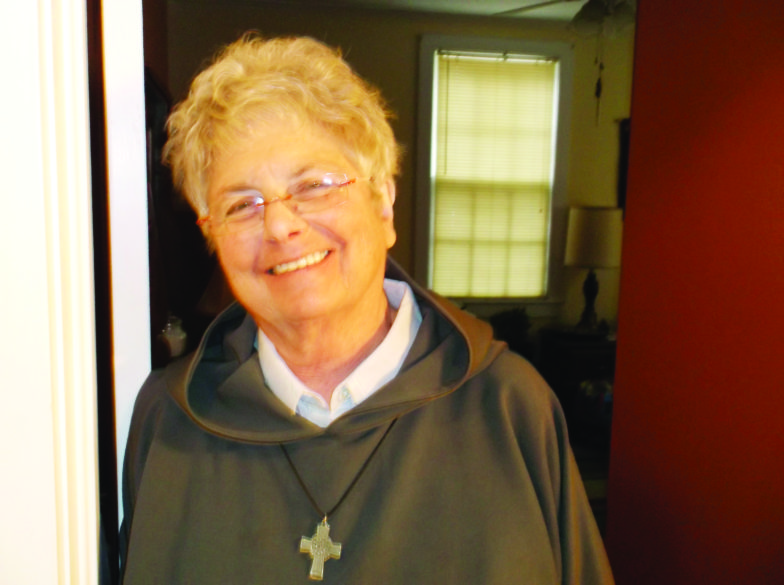
I wonder if we’re in a time of rummaging around in our own lives, the church’s (especially) and our cultures to find those threads that may, or may not, come together? At what level is there no anguish? Huge fires/climate change, pandemic, hurricanes, interpersonal strife, loneliness, international disregard, where indeed is the thread that draws us together? These are a part of deficit culture … what brings us to see a culture of beneficence?
Back in 1984 Michael Ignatieff, in The Needs of Strangers, reflected this: “If we deceive ourselves about what we need, we are likely to be deceived about what strangers need. There are few presumptions in human relations more dangerous than the idea that one knows what another human being needs better than they do themselves … if we need love, it is for reasons that go beyond the happiness it brings; it is for the connection, the rootedness, it gives us with others.”
Notice our strange mixtures. Consider a blood family of three children and parents, for example, and wonder sometimes if they are connected! Maybe it will be facial, or the sound of voice, or a certain talent, or hair color. Some things will indicate that they are ‘related.’ What are the things in God’s family that show, though in very different ways, ‘we’re all related?’ What are those ‘six-degrees’ of separation that bond us? How do we put together those many strands and threads and celebrate?
Within the human community, and indeed within the community of believers, there are as many differences as similarities. Bottom line stretches to ‘human’ (all bleeding red blood), ‘we all have certain needs’ and we are on a path that calls us forward from ‘birth to death.’ Beyond that almost everything else, social status, color, attitudes, beliefs, fears, competences and the lot are as individual as we can imagine. We are strangers as often to ourselves as to others.
One stereotypical image of a beggar is perhaps a homeless person blinded by disconnection from self, family, housing, medical care and food. We have a persistent beggar within, the unwillingness to be born/change things by refusing to allow the Spirit to prompt growth. We can spend inordinate amounts of time telling others what they need, what they should do/not do, what they ought to understand. Rather we might remain silent and allow them to discover their own threads. Or we might ask questions that will help reveal the beggars within us.
We might agree that racism, not telling the truth, or the –ism you pick are evil, sinful, horrid. We might agree but what to do about it needs input from the sufferers outlining some change. Opinions and political implications and others have dictated what to do for many years and have been relatively unsuccessful. Where is my heart stuck? What does my heart have to contribute?
Ignatieff reminds us: “the theory of human needs is a particular kind of language of the human good. To define human nature in terms of needs is to define what we are in terms of what we lack, to insist on the distinctive emptiness and incompleteness of humans as a species.” To know our ‘beggars’ is to discover not only what we need, but what we have to share. To define others (the poor, the wayward, the unborn, the prisoner, the weary, the old) by what they lack is a deficit culture and we never see beyond as Jesus sees.
Van derPost in his 1973 The Seed & Sower, points this out: “… I did not understand the sabotage in the invisible dimension of my being… There is a strange, persistent beggar at a narrow door asking to be born; asking again and again, for admission at the gateway of our lives.”
If we want to be born, or allow those threads to come together within, we might encourage ourselves to act, to build the Beloved Community. Perhaps that’s the kind of love that makes a difference, that ‘good trouble’, the kind that ‘relates’ us? Might even be the beginning of real change?
BLESSINGS.
(Sister alies therese is a vowed Catholic solitary who lives an eremitical life. Her days are formed around prayer, art and writing. She is author of six books of spiritual fiction and is a weekly columnist. She lives and writes in Mississippi.)
Theology at the movies: an “Unorthodox” view from the diaspora
THEOLOGY AT THE MOVIES
By James Tomek, Ph.D.
How do we read “Unorthodox,” a recent four-part series on Netflix of a woman, Esty, who flees from a Hasidic community in New York in search of a new community in Berlin? Is the film about the problems of Jews to maintain their culture in the “diaspora” – the land outside of Palestine/Israel? Esty rebelling against the Hasidic culture? About how women are imprisoned in their religious cultures? Do we have the right to “educate” women and men who live “happily” in a culture that could be repressive? Ultimately, do we really learn anything specific about Hasidic culture other than seeing the stark clothing and witnessing devotions without understanding the words? Can we, in turn, question our Catholicism about some of its customs? We are all in the diaspora – “scattered” from our origins seeking security.
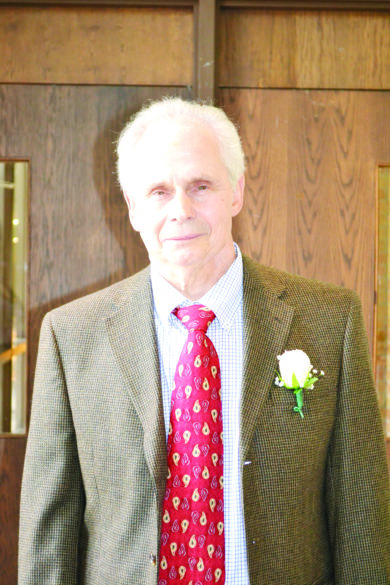
In “Unorthodox,” Esty, escapes an unhappy marriage and flies to Berlin where she tries to fit in with a group of student-musicians. Flashbacks reveal how she was raised by her grandmother in a Hasidic community in Williamsburg, Brooklyn; entered into a prearranged marriage with Yanky Shapiro; was naive in the sexual facts of life; became pregnant, and at present, decides to flee the closed community to go to Berlin. Why? Her mother, excommunicated earlier from the community, had gone to Berlin where she now lives with her partner and works as a nurse.
The Hasidic (meaning pious/piety) form of worship started in the 18th Century in Poland. In the face of persecutions, the Hasidic Jews devoted themselves to preserve their form of worship. The black suits and head wear were ways of reminding themselves who they were, especially in the diaspora. The Williamsburg community people are more recent descendants of the Satmar community in Hungary, preserving their religion from the horrors of the World War II Holocaust.
Is Esty a descendant of the biblical Esther? Esty, like Esther, is a heroine in a foreign land. The book of Esther is about Jews living in Persia after the Exile in 486 BCE. The King chooses Esther, a Jew, to replace his first wife as Queen. Esther’s cousin, Mordecai, enrages the current Prime Minister, Hamon, who wants to annihilate all the Jews. Mordecai convinces the King of Hamon’s evil plot. The Jews are accepted and Hamon is executed. The Jews celebrate their victory over death in a foreign land with the Feast of Purim. The Talmud, ethical commentaries on the Hebrew Scriptures (in a way, a Jewish New Testament), is ambiguous about Esther. It is a difficult book to love since it is about vengeance and with little or no mention of God’s providence.
Is our Esty a new Esther in a foreign land? She meets with musicians studying in a Berlin conservatory. In an early outing, she enters a lake, and joyfully, baptismally takes off her sheitel, a wig used to hide her hair when out in public. She has an intimate relation with one of the group and finally is admitted to take a test to enter the conservatory. She finally chooses to sing a Yiddish folk song for her audition. She is pursued in Berlin by her equally naive husband Yanky, and a relative, Moishe, who is equally at home in Hasidic ceremonies as well as in capitalistic casinos and bars. Esty refuses Yanky. Moishe, at first aggressive in wanting to bring Esty back, undergoes his own baptism as he seems torn between the two cultures, seen in his symbolic undressing and wading in the Spree.
Do we have a right to educate people who are happy in a culture or religion that may imprison them? The Jewish community in Williamsburg seems to be getting along very well. Is Esty being deprived of the freedom to grow? Do we have a right to “free” this woman from her religious community? Do we know enough about our own religion?
The Hindu religion has four ways to the divine – four ways of being religious: knowledge (jnana) [study], devotion (bhakti) [ceremonies], duty (karma) [good deeds], and meditation (raja) [prayer]. The Hasidic Jews emphasize devotion. The film succeeds in showing the appearances of this Hasidic community and how its marriages are arranged and the Sabbath celebrated. However, it is short on the “knowledge” part. Why the elaborate headdresses or stremeil for the men? The growth of side locks of hair? What is the meaning of the Yiddish folk song through which Esty wins over her audience?
I prefer the way of “knowledge,” so by that I mean studying why we do certain things in our devotions. Some enjoy the karma or duty – doing good deeds. Others find pleasure worshiping without questioning the whys.
The film “Unorthodox” succeeds in showing appearances of a Hasidic community. But, how do these showings reflect their memories? We are all in the diaspora – away from our origins. Our Catholic way of remembering is in the Mass – not necessarily in the priest’s vestments or shape of the church and altar – but in the scriptures read and the shared meal where we remember Jesus’s sacrifice.
(James Tomek is a retired language and literature professor at Delta State University who is currently a Lay Ecclesial Minister at Sacred Heart in Rosedale and also active in RCIA at Our Lady of Victories in Cleveland.)
Mobile pantries are a lifeline for many
By Laura Grisham
SENATOBIA – A steady stream of cars maneuvered through the parking lot at St. Gregory The Great Catholic Church last Thursday. The mobile pantry in Senatobia had been open for just over an hour. Volunteers and staff, with machinelike movement, gathered boxes and bags of produce, cereals, meats and other staples and placed them in the vehicles as they rolled through.
Even before the coronavirus pandemic wreaked havoc on the nation’s food supply and economy, nearly one in every five Mississippians had trouble getting enough food due to lack of income or other issues. Disruptions to food-supply chains, employment and other services because of COVID-19 worsened the situation.
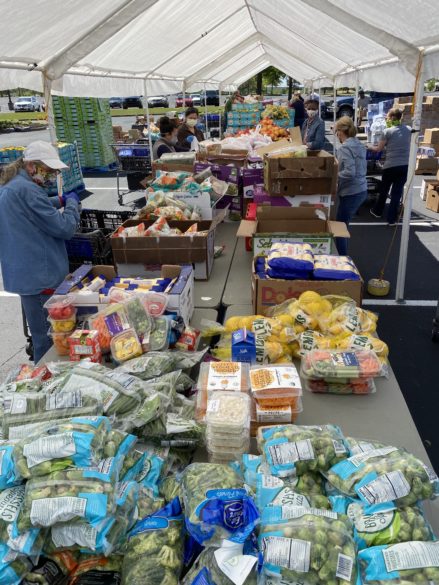
For more than six years, Sacred Heart Southern Missions (SHSM) has sponsored the DeSoto and Marshall County mobile pantries, providing fresh, nutritious food to struggling families and individuals each month. The mobile pantry program brings regular food distributions to the hard-to-reach places that need it the most. A tractor-trailer full of fresh fruits, vegetables, shelf staples and meats are distributed at each of our mobile sites.
Given the toll the public health crisis has taken on communities across the area served, SHSM has intensified its efforts to safeguard the health and wellbeing of poor families, especially older adults and children, who lack sustained access to healthy food and adequate nutrition.
Since the onset of the pandemic in mid-March, SHSM has hosted 22 mobile food pantries across the five counties of their service area. That’s an additional ten distributions on top of their regularly scheduled mobiles. In six months, more than 430,000 pounds of food has been given out to hungry families at these distributions — more pounds than all of last year’s mobile pantries combined.
Tragically, the disabled and elderly are some of the most vulnerable that SHSM serve. Nearly one third of those who come to SHSM social service offices for assistance are the elderly poor. Attempting to balance basic living expenses on fixed incomes, they are presented with an impossible choice — to pay for utilities, life-saving medicine or a meal on the table. And now, with the COVID-19 pandemic, they are more vulnerable and isolated than ever before.
“These days, at a trip to the grocery store, I only get about half of what I used to,” said Lee, as he waited in line. “I am on a fixed income. The price of everything has gone up, but what we old folks get has not. I can’t hardly afford to eat.”
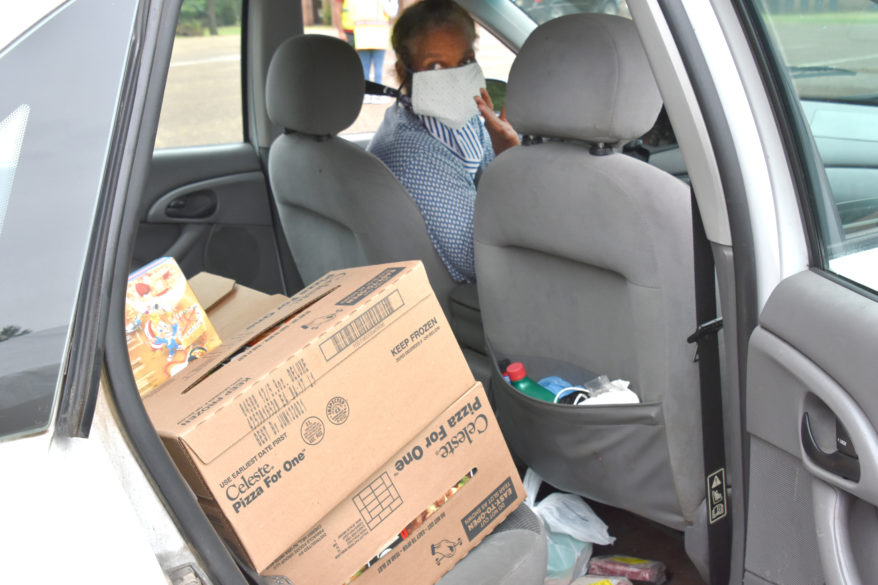
Lee says the mobile pantries provide him with the extra groceries he needs to make it through the month. For his sister, Carol, who was in the car behind him, SHSM’s distributions are even more critical. Carol has cancer.
“My twin sister, Carol, back there,” Lee motioned to the car behind his, “she is terminal. She can’t afford nothing with buying medicine and all. I told her about this food and it is helping her and her family out a whole lot.”
For seniors and other adults who are at high risk for COVID-19, the mobile pantry program is a blessing in several ways. Besides providing them with fresh, healthy food and supplementing their meager incomes, the drive-through distribution arrangement allows them to avoid crowded retail stores, thus reducing the possible exposure to the virus.
Mattie, another elderly woman in line commented, “This food sure helps me be able to pay my bills.” A friend had told Mattie about the mobile opportunity in Senatobia last month. Eagerly, she inquired when Sacred Heart would be returning for another distribution. “I was so glad that I could get it so close to home. Thank ya’ll so much!”
Food pantry manager Jose Franco said that grateful comments like these are a common occurrence at the mobiles. “You hear them all the time! There are so many people in need, and they are thankful for the help.”
Hunger is a problem that most often affects low-income families. Many hardworking families and individuals are living paycheck to paycheck, then suddenly, an illness or other disaster strikes and they can no longer afford food. Others juggle their bills every month, knowing there will never be enough money.
Jose recalled last month’s mobile food distribution in Senatobia. As he assisted a woman with her intake form, he noticed three young children in the back seat of her car. The woman explained that she and her husband had both recently lost their jobs and they had no food to give their family. Pointing to the form, she said, “We don’t have any income … is that ok?”
“That was heart-breaking,” Jose said quietly.
Unfortunately, this woman’s plight is something SHSM sees often. Yet, no matter how many times they meet people struggling in life and hear their stories, the impact on them never lessens.
SHSM continues to prioritize food distributions in their communities in Northwest Mississippi.
Through the generosity of our donors and the continued support of volunteers, SHSM is able to ensure that people like Lee, Carol, Mattie and countless others facing unimaginable financial challenges have access to nutritious food. Looking ahead, additional pop-up mobile pantries have been added to SHSM’s regular monthly schedule to help even more people in need, providing them an essential lifeline during these difficult times.
Sisters continue to help on the frontlines
By Berta Mexidor
JACKSON – Catholic Extension, in collaboration with several organizations, has launched the program, Sisters on the Frontlines, to help families impacted by COVID-19 and at the same time ”recognize the vital role of Catholic sisters in communities where needs are great.” The goal of the initiative is to give 1,000 sisters, $1,000 each to provide rapid response to the poor and distressed.
Five sisters in the Diocese of Jackson have received the Sisters on the Frontlines grant, so far: Sister Lael Niblick and Sister Mary Christine Fellerhoff from St. Helen Amory; Sister Nancy Schreck in Excel in Okolona; and Sisters Maria Eugenia Moreno, MGSpS and Obdulia Olivar, MGSpS in St. Michael, Forest.
Excel in Okolona
Excel – a nonprofit organization in the area is the center for the sisters to help, explained Sister Nancy Schreck. There are five sisters from three different religious congregations working in Okolona. The regular outreach includes after school and summer learning, adult basic education, english language learning, a senior center, a resale store and a variety of other programs for community needs. “This provides our ability to know the community and for people to know Excel and to come with their needs. What we do is different from a traditional parish. These Excel’s programs provide us with good knowledge of the community needs,” Sister Nancy said. Due to COVID-19, all the programs have concentrated on providing material and emotional assistance to people living on the edge of poverty, immigrant families in the area who do not qualify for public assistance, families with school-age children and especially the elderly.
Food insecurity has been a major issue for the community. With COVID-19, “food scarcity became an issue to be addressed,” said Sister Nancy. “The assistance we at Excel get is uneven, sometimes people bring meat, at another time it has been dairy products from Prairie Farms in Tupelo, some funds from United Way, and Create, the grant from the Extension Society, and so forth.”
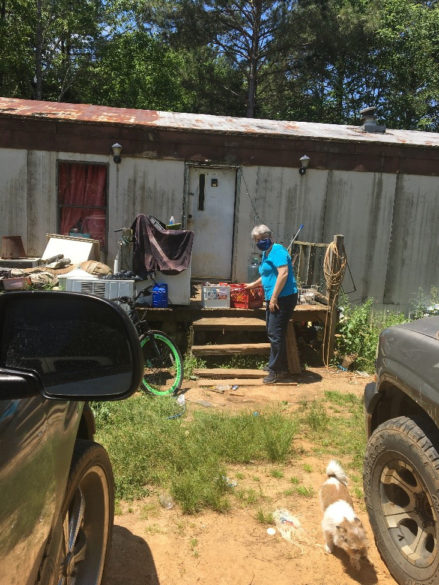
St. Helen Parish Amory
The grant from Sisters on the Frontlines was used to help families affected by the COVID-19 pandemic, “…not because they themselves had COVID, but because their lives were changed by the pandemic,” said Sister Mary Christine Fellerhoff, CSA, the executive director of CHANGE in Amory. The organization is a community-wide, ecumenical nonprofit located in the parish center of St. Helen Parish in Amory, providing financial assistance since 2014 to families living in poverty.
Sister Mary said that CHANGE closed their operations around March due to the COVID-19 outbreak and reopened again in June, taking all the hygiene and social distance measures for the safety of staff and clients. “For me as a religious sister, COVID-19 has intensified the feelings I always experience when ministering to our clients. We share their suffering, their frustrations, their tears, and, yes, their small triumphs,” Sister Mary explained.
Sister Lael Niblick, CSA, lay ecclesial minister of St. Helen Amory says, “I feel both blessed and challenged in assisting our members to grow as disciples of Christ and to build a strong Christian community.” Along with Sister Mary of CHANGE, Sister Lael also received the Sisters on the Frontline grant.
As for the pandemic, she says her ministry has been impacted, with a few of the parish members have been diagnosed positive, a couple of them in a nursing home and two asymptomatic cases in a family. To impact her ministry further, Sister Lael was in a serious car accident at the end of July, putting her physically unable to help others, relying on other parishioners to aid her in continuing her mission to help others in need.
“Nevertheless, we have aged and ill members, several with cancer diagnoses. I am saddened by my inability to visit and take Eucharist to our homebound on a regular basis. Although we have opened the church to Mass on a restricted basis (masking, social distancing, and sanitizing), we feel deeply the fact that we cannot come together as a church community,” said Sister Lael.
Stories are bountiful from Sisters Mary and Lael on how they were able to help others with the Sisters on the Frontline grant. Here are a few of those stories (names have been changed for privacy):
- “Sally” lost her job due to budget cuts from COVID-19, she was in the process of seeking a divorce from her abusive husband, with three children. Sister Mary was able to help her with an electric bill to help keep her family in their home.
- “Sasha” lost her job when the pandemic struck. The restaurant where she worked let her go because she was pregnant and felt she was at a greater risk to catch the coronavirus. Normally able to manage, her income was drastically reduced, even with unemployment, government aid and SNAP benefits. The grant was able to assist her with a utility bill when funds were unavailable through CHANGE to help.
- “Annie” broke her hip and after a successful surgery, entered a nursing rehab facility as the pandemic struck. She had to quarantine for weeks before therapy was possible. “Annie” learned that she would need a ramp built on her home before she could be released from the facility, but being on a fixed income, she had no extra funds for the project. With the help of the grant and a generous donation of labor from a contractor), CHANGE was able to assist in building a ramp for “Annie” to continue her recovery at home.
Neither COVID-19 or a bad car accident stopped Sister Lael in her optimism. “This difficult situation calls forth creativity. We are developing ways to connect with our members in a variety of ways through social media, technology, and the written word,” she said. “Thank you FADICA and the Extension Society for the Sisters on the Frontlines grant enabling us to make Annie’s homecoming a joyous one.”
Sister Mary concluded saying “We feel blessed to share these clients’ stories, their tears and their gratitude. We are privileged to serve them.”
All the recipients of the Catholic Extension grant agree and share these challenges: trying to find a new way of delivering programs and create socialization this time with heavy safety measures and social distance. Sister Nancy expressed her gratitude for the ”flexibility of the Extension Grant. [It] has been very helpful in this regard.”
Since the program began in June, more than 378 sisters have received support from the Sisters on the Frontline grant program and another 622 have requested funds.
Sisters who have received funding are asked to report back to Catholic Extension as to how the funds were used. Catholic Extension will be sharing the sisters’ stories as they are received. To learn more or to donate, visit https://www.catholicextension.org/sisters-on-the-frontlines/.
Hawke talks faith in action at Queen of Peace Olive Branch
Michael Hawke, third degree Knight of the Father Leo John Dehon Council 14051, speaks about living out his faith on behalf of the “least of these.” (Matthew 25)
What does it mean to you personally to put your faith into action?
I was always taught that the best way to bring others to the faith is simply to show them what a person living a faith-filled life can look like. I have never been one to actively evangelize through discussions with people, but I try to do it by living as the best example I can, answering questions when people ask. My Catholic faith is part of my daily living. It shapes how I look at the world and other people. Always looking for Christ in others.
In general, how do the Knights show faith in action?
First and foremost by being an open, welcoming group of compassionate people. I firmly believe that Christ’s intention was for us to be welcoming of all people and walks of life and to refrain from being judgmental. That has never meant changing my own values to match others, but instead always trying to be understanding of where they are coming from. If their actions and thoughts don’t match up with Catholic teaching, it may simply be because they have been misled. But it is not for me to judge. It is always for me to act with compassion to them and treat them with respect.
I believe that the parish and the Knights of Columbus must embody that spirit. We believe in service to others without asking their affiliation or life choices. Simply helping those who need help and, hopefully, through that example, we bring more people to our faith. I believe that by being that example to the public, without using it only to “show off” or “gain publicity,” is the single most important thing any group of faith can do. Those actions are what will generate curiosity in others, sowing the seeds that the Holy Spirit can use to change a person over time.
Describe one or two of your ministries where faith in action is seen.
First, the Knights of Columbus as a group shows faith in action. As a group we stand together as practical, Catholic men, not ashamed to make that claim or wear the signs of our brotherhood. Through that we can seek support from each other on our own faith journey while aiding people in the community who need it. By being visible both in the community and the church, we show that it is still possible to be a practicing Catholic who has compassion and working to make things better for everyone.
A second ministry that is near to me is RCIA. I have acted as a sponsor and teacher for the program, currently and in the past. It is always important to me as the process unfolds to help people understand the misconceptions about the Catholic faith that were taught in my protestant and non-denominational church as a way to scare people away from Catholics. As they learn what our faith is truly based on, they can interact with Catholics in that setting where than can see that many of us have had faith struggles. They see people converting, and a change can be seen in their outlook and faith. It brings me a great sense of peace to know that I have helped sow the seed of faith in someone and brought them to our beautiful Catholic tradition. Through that process I continue to learn more about both our faith and myself. The questions and challenges that people learning our faith go through become a catalyst for me to question things myself in order to learn more about our faith.
What impact has this faith in action ministry had on the people served and on those involved in the ministry?
I think the biggest impact that I have seen with RCIA is to help bring people to our faith. Most importantly, providing some ways for them to develop a personal relationship with Jesus and God the Father. To understand that he is someone they can talk to as long as they are willing to listen. When I see people continuing to go to Sunday Mass after completing the program and becoming a full member it brings a sense of peace to my soul.
What challenges have you faced in developing this ministry and what kept you going despite the challenges?
I have faced a couple challenges, both personal and because of work. I travel frequently for work which makes it more difficult for me to participate at times in parish activities. But Queen of Peace parish, and the Knights of Columbus have always been understanding of those difficulties and been willing to work with me on schedules. I was always apprehensive to get involved because it was hard for me to commit, knowing that a sudden business trip could call me away. However, once I started into the parish as a lector and Extraordinary Eucharistic minister and realized that the parish and people in it would work with my scheduling issues, I slowly became more involved in other things.
As a teacher and sponsor within RCIA, it is sometimes a challenge to remember that we are all in a different place in our faith journeys. There are tenants of our faith or ways that the church has acted that some may accept and others will struggle with. It works both ways. It is important to remember that we each come to the Lord’s table as who we are, bringing our own doubts, sins, gifts, and talents. The Lord accepts all of us and expects us to do the same of others. Everyone has their own struggles of faith they are working through. I would guess that very few people besides maybe the Pope fully accept everything or understand everything the church presents or teaches. That is why as Catholics we believe that conversion and being “saved” is a lifelong process and not something that happens in an instant.
What suggestions do you have for people that aren’t sure how to put their faith in action?
To start somewhere, simply. The easiest and most comfortable place to start is with like-minded people. If your family shares your faith, that is a place to start. If not, work to find a group at your parish that you can act through. There is plenty of fellowship in the available groups of people, like the Knights of Columbus, or men’s and lady’s clubs, etc.
The important thing is to start somewhere. Once you start, you will continue to grow. And don’t be afraid to try a different parish if you can’t find what you need. Every parish has its own personality and groups of people. No one should feel bad about wanting to try a different parish to get what you are looking for. Our faith is a journey, that means accepting change and going to new places to find what you are looking for.
I have been blessed with living many different places in the U.S. and traveling abroad for most of my life. That has allowed me to experience parishes throughout the country and made me come to the realization that everyone is different. From the people, to small changes in how Mass is celebrated, or the flow of the church. All those things are part of the faith experience and you must be willing to hunt around and find what you are looking for. No one else can do it for you.
Calendar of events
SPIRITUAL ENRICHMENT
NEW ORLEANS Our Lady of the Cenacle Retreat Center, Women’s Retreat “Joy in the Face of Adversity,” Oct. 16-18, check-in is at 3 p.m. on Friday and concludes after lunch on Sunday. We will reflect on God’s unconditional love for us and His desire that we live lives filled with joy. Presenter: Father Doug Doussan, retired and currently serving as Resident Chaplain of the Retreat Center. Cost: $350 and includes accommodations and meals. Because of the special circumstances of the COVID-19 situation, no deposit is required to register. Full payment will be collected upon arrival at the retreat center. Details: to register, contact Susan Halligan at (504) 267-9604 or https://www.neworleansretreats.org/retreats. If you need financial assistance, contact Kim Gandolfi at (504) 887-1420.
PARISH, SCHOOL AND FAMILY EVENTS
CLARKSDALE St. Elizabeth, Parish Fair, Tuesday, Oct. 6 from 5-7 p.m. This year the fair will be drive through food items only with some surprise booths. The sweet shoppe and frozen casseroles will only be offering their top five items to be purchased. Details: (662) 846-6273.
GREENVILLE St. Joseph, The Parish Fair originally scheduled in Sept. has been rescheduled for Nov. 2020. More information will be forthcoming. Details: church office (662) 335-5251.
LELAND St. James, Annual Parish Fair originally scheduled in Sept. has been rescheduled for 2021. Details: church office (662) 686-7352.
JACKSON St. Richard, Bereavement Support Group, resumes Thursday, Oct. 8, at 6:30 p.m. The topic will be general sharing on the difficulty of grief during the pandemic. Many have lost loved ones right before or during this time. The group is for all who are hurting from losing a loved one or for those who are trying to comfort and understand the grief of a family member or friend. If you know someone who is bereaved, please invite them. Masks are required and social distancing adhered to. Only bottled water and canned drinks will be served. Please RSVP as soon as possible in order to plan accordingly. Details: Nancy McGhee (601) 942-2078 or email ncmcghee@bellsouth.net or Suzie Cranston (601) 982-5464.
NATCHEZ Assumption of BVM, Grief Support Group, a 13-week program on Tuesdays beginning Oct. 6 at 6:30 p.m. in Tuite Hall. Cost: $15 for workbook. Details: Carolyn Verucchi at (601) 807-1698 or church office (601) 442-7250.
St. Mary Basilica, Women’s Retreat, Sunday, Oct. 4 from 11 a.m. to 3:30 p.m. in the Family Life Center. “Making Room for God in the Busyness” with Becky Eldredge, author of Busy Lives & Restless Souls. Come renew your spirit and explore practical ways we can make time for God and prayer in our lives, even amidst the busyness. Please join in and bring a friend. Cost: $15 includes box lunch. Details: Ruth Powers at ruthprocoordinator@cableone.net or (601) 445-5616.
St. Mary Basilica, “Into the Breach,” Tuesdays, Oct. 6, 13, 20 and 27 from 6-7:15 p.m. It will be held in the Family Life Center and is sponsored by the Knights of Columbus. This is a Faith Formation program specifically for the men of the parish. Many men receive mixed messages concerning who they are and what their role is. This program is focused on helping men of all ages grow into an authentic Catholic masculinity as men, as husbands and as fathers. Facilitator: Kevin Friloux, Lecturer and Faith Chairman of Bishop R. O. Gerow Council 1034. There is no cost for the program. Details: the church office (601) 445-5616 or Ruth Powers at ruthprocoordinator@cableone.net to register.
SOUTHAVEN Christ the King, Pumpkin Patch Fundraiser, Monday, Sept. 28 to Saturday, Oct. 31 from 12-8 p.m. sponsored by the Knights of Columbus Council #7120. Some of the specific programs these funds support include: Coats for Kids, relief for persecuted Christians, Gary Sinise Foundation (for disabled veterans), priests’ formation and priests’ retirement. Details: church office (662) 342-1073.
YOUTH BRIEFS
NATCHEZ St. Mary Basilica, CYO Youth Day, Sunday, Oct. 4 from 11 a.m. to 3:30 p.m. Facilitator: Stephanie Clouatre Davis, who was spent more than 23 years in youth ministry as a retreat facilitator, teacher and youth minister. The day will include lunch, fun, games and prayer. Cost: $10 registration fee; lunch and snacks will be served. Details: email stmaryyouth@cableone.net to register your teen or for further information. Payment can be made via Venmo. You will receive the Venmo account information when you send an email to register. You can also call the church office (601) 445-5616.
COVID-19 REMINDER
In person Masses are now open at many parishes within the Diocese of Jackson. Check with your local parish for details and follow guidelines in place for attendance. All over the age of two are required to wear a mask.
The obligation to attend Mass continues to be dispensed by Bishop Joseph R. Kopacz, so if you do not feel safe attending, or have an underlying health condition, or feel sick, please stay home. Be safe and stay vigilant!
Recuerdos de Sacramentos
FOREST y MORTON – Después de la apertura de la iglesia de San Miguel, siete niños recibieron la primera comunión y seis jóvenes su confirmación (i-d) Emily Ponce, Hugo Salazar, Diana Carrillo, padre Roberto, Catti Pérez, Iris Pérez y Marvin. (Fotos por cortesía del padre Roberto Mena, ST)
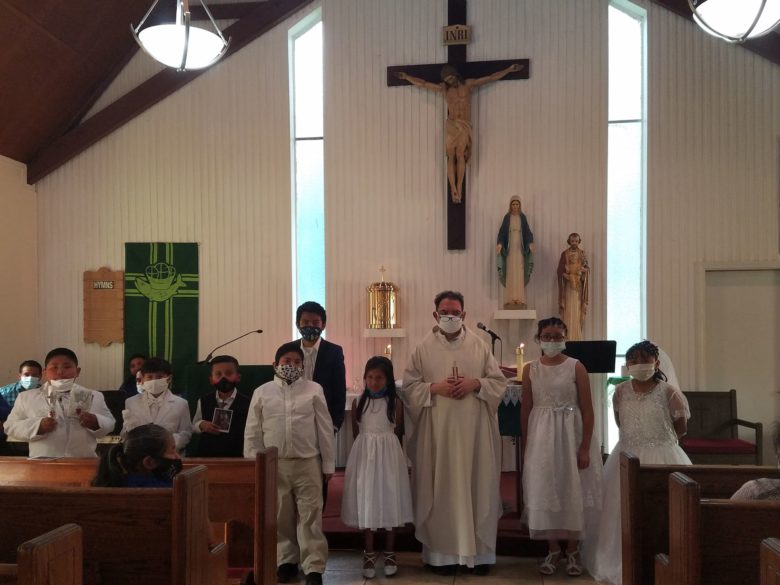
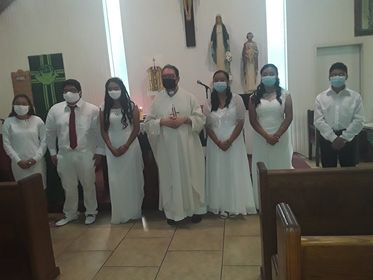
CARTHAGE – En la foto (arriba-centro), en el día de su Confirmación (i-d) primera fila de arriba Edgar Modesto, Anthony Garcia, Sandra Pérez, P. Odel Medina ST, Efraín López, Giovany Garcia, Karol López; fila de abajo: (i-d) P. Gustavo Amell ST, Tracy López , Daysy Modesto, Yazmin González, Yocelyn González, Evelio Ramírez y Nicodemo López (catequista). (foto cortesía de Oscar Aguilón.)
En foto (derecha), en el día de su confirmación, arriba (i-d) Anderson Morales, Fr. Odel Medina S.T, Héctor Raúl; abajo (i-d) Hugo Agustín, Marco Vásquez, Mirna Miranda, Yesica López, Cheryl Salvador, Suleima Anahi, y Nicodemo Lopez (catequista). (fotos cortesía de Gionavy Garcia)
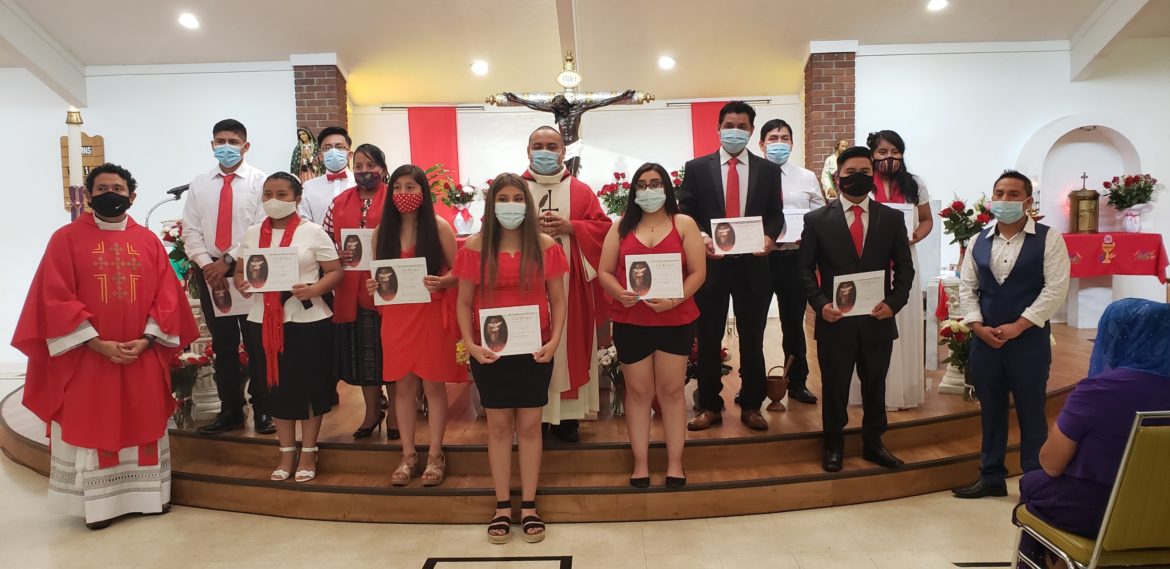
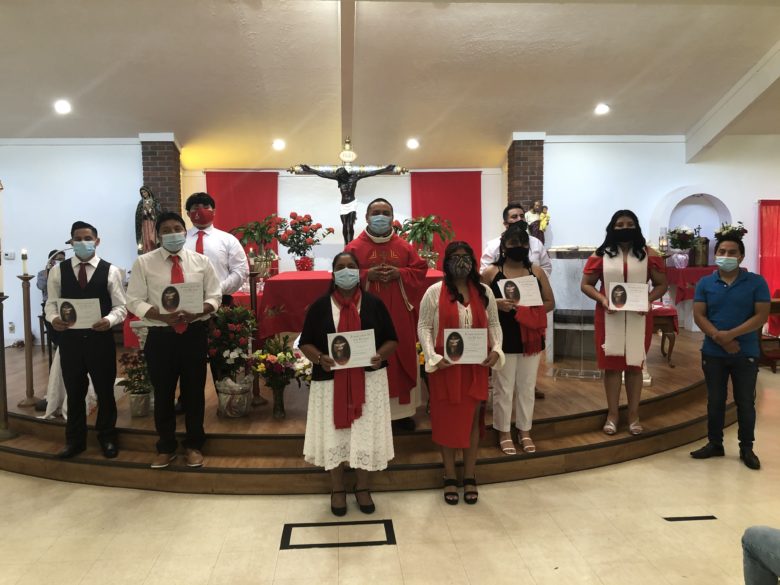
En foto (izquierda), primer grupo que recibió primera Comunión, el 25 de julio para celebrar la fiesta de Santa Ana, (i-d) en altar Poedro López, Padre. Odel Medina S.T, Enmanuel Modesto, Yens Snyder López; abajo (i-d) Edward López, Amber Salvador, Alan Modesto, Casandra López, JaDavis L. Rayveon y Lou Joyner (catequista).
